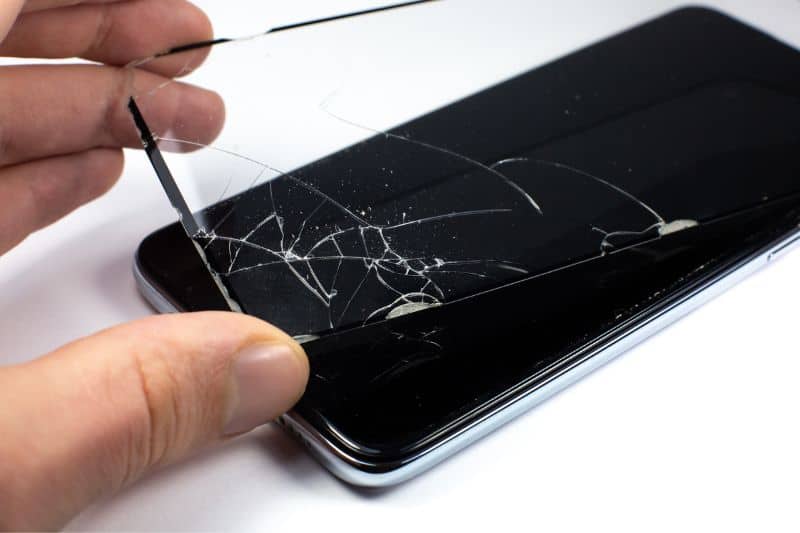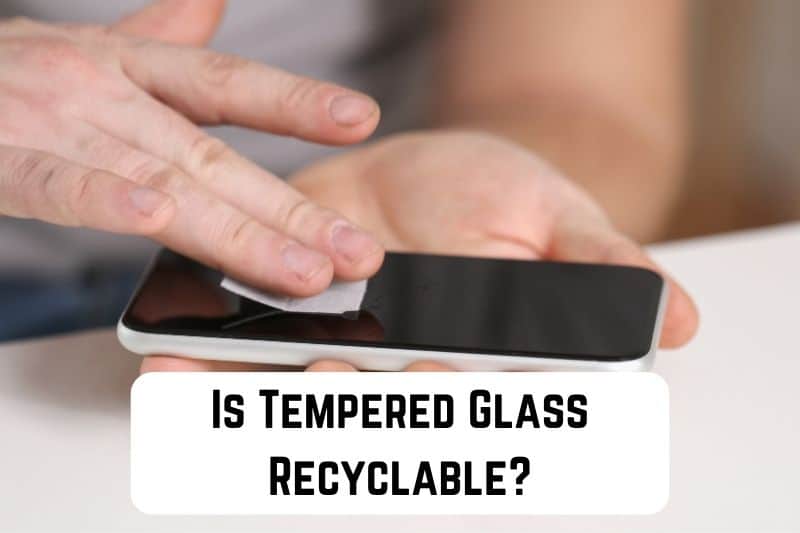Tempered glass, sometimes known as safety glass, is a far better option than regular glass. Because of its sturdy design, getting rid of it can be time-consuming. It is important to note that there are better options than throwing this item in the trash or recycling bin. Most buildings have tempered glass, according to IRC.
Is tempered glass recyclable? That depends on your definition of recycling. You need to know how to dispose of broken tempered glass safely and correctly. It is advisable to ascertain whether the tempered glass is recyclable in your locality.
What is Tempered Glass?
Tempered glass is a reinforced material utilized when annealed glass isn’t robust enough. Applying heat can strengthen glass up to four times, resulting in tempered glass. Tempered glass is produced by rapidly heating and cooling glass to a considerably higher degree than ordinary glass.
Normal, annealed glass is subjected to a thermal tempering procedure that modifies its composition to cause it to break differently and boosts its strength. After heating to more than 1,000 degrees Fahrenheit in a furnace, high-pressure air bursts are used to cool the glass swiftly.
Because of this, the glass’s exterior layers cool considerably faster than its interior layers, causing the interior to separate from the exterior as it cools. As such, the outside experiences compression, and the inner stays in a condition of tension. Tempered glass is significantly stronger than annealed glass because of these opposing pressures.
Because of the tempering process, this kind of glass breaks into little, spherical fragments rather than sharp, jagged shards. Ordinary, untreated glass is prone to breaking into short fragments known as spalls, which can result in serious injuries during severe weather or explosions such as bombs.
Tempered glass is frequently called “safety glass” because of its capacity to stop spalling and protect building occupants. Tempered glass, sometimes called “safety glass,” is commonly used in shower doors, car windows, glass tables, and other applications requiring higher safety standards.
Tempered glass is made to be more force-resistant throughout the manufacturing process, although it is not infallible or unbreakable. It will withstand more force than ordinary glass, but it shouldn’t be used to deter attackers.
Additionally, the tempering procedure increases the glass’s resistance to breakage from elevated temperatures. For this reason, tempered glass is sometimes used in appliances or fireplace doors where high temperatures increase the risk of glass breaking.
Can Tempered Glass Be Recycled?
Tempered glass is recyclable but cannot be recycled identically to regular glass. This is so it can be stronger and more resilient than ordinary glass. Tempered glass is treated using a unique heating and cooling procedure.
The glass is heated to an elevated temperature and quickly cooled through the process, causing a surface pressure that prevents breaking. Tempered glass cannot be burned down and recycled similarly to ordinary glass, which presents a challenge.
Tempered glass fractures easily into small, spherical fragments that are challenging to sort and distinguish from other materials. Because of this, large-scale recycling of tempered glass is difficult.
Nonetheless, tempered glass can be recycled in a few different ways. Using it for ornamental or landscape reasons is one possibility. Crushed tempered glass may be used instead of gravel or sand for landscaping tasks like building walkways or backfilling drainage ditches. Additionally, it can be used in concrete or other construction supplies as a decorative element.
Reusing tempered glass in its initial state is an additional choice. For instance, old shower doors and windows can be used again for projects like building an herb garden or a glass art piece. This decreases waste, and a substance that would otherwise be thrown away is given new life.
Tempered glass may occasionally be recycled using specific recycling initiatives. Usually, glass producers or recycling businesses with the tools and know-how to work with tempered glass provide these programs. These programs might not be available to everyone and are not generally accessible.

Factors That Impact the Recyclability of Tempered Glass
Tempered glass can be recycled in some circumstances. If the object is undamaged and in good condition, it could be carried out by specialist facilities with the necessary classification and processing capabilities. The degree to which tempered glass can be recycled depends on several factors.
Glass Condition
Tempered glass subjected to extra strain or impact could not be suitable for recycling because of its state. As a result, recycled tempered glass with chips, scratches, or other damage should not be used.
The Glass Composition
Standard glass is heated to a very high temperature and quickly cooled to create tempered glass. This process alters the glass’s molecular structure, increasing its resistance to breaking.
But it also makes recycling the glass more challenging. When glass is subjected to high temperatures, the quick cooling process causes internal strains in the glass that may break. This implies that tempered glass can’t be recycled in the same manner as ordinary glass when it is melted down.
Type of Tempered Glass
Tempered glass comes in several forms, such as laminated and heat-strengthened glass. The two most popular types of tempered glass are laminated and heat-strengthened; however, the one used can affect its recyclability.
Glass Size
Tempered glass’s capacity to be recycled may be impacted by its size. Since managing the larger and heavier parts becomes more complex, recycling becomes more expensive and time-consuming.
Availability of Recycling Center
More infrastructure for the recycling of tempered glass might be required in some places. This may hinder the effectiveness of those attempting to recycle such items and present a challenge to them.
Chemicals
Tempered glass includes compounds that ordinary glass does not, which is one of the primary causes why it cannot be recycled. These substances make it more difficult for glass to break down. This implies that the recycling plant finds recycling glass in a recycling bin challenging.
Strength
Tempered glass is strong, making recycling one of the biggest obstacles. Because tempered glass is up to five times more durable than ordinary glass, breaking it into smaller pieces is challenging.
Glass is recycled by breaking it into tiny bits to be burned down and used to create new goods. Tempered glass is not recyclable in the same manner as ordinary glass because of its strength, which makes it difficult to crush.
How To Dispose of Tempered Glass?
More infrastructure could be required in some places to recycle tempered glass. This may hinder people’s capacity to recycle such items efficiently and present a challenge to them. Below are the ways to dispose of tempered glass.
Recycling Center
Taking tempered glass to a recycling facility that handles this kind of glass is the best method to eliminate it. These facilities have the knowledge and skills to handle tempered glass and dispose of it sustainably and safely. But not all recycling facilities take tempered glass, so before bringing your glass there, make sure it’s accepted there.
Get Creative
Think creatively about the items you need for your house. What other uses are there for your tempered glass? If you have a lot of small broken pieces, you might utilize them to create helpful household products, decorations, or artwork by learning how to create a mosaic. For those with artistic ability, painting on tempered glass is fascinating.
Artists
Give your glass to artists so they can utilize it in their works; occasionally, co-ops or youth development art programs will need it. You can look through the newspaper or contact a nearby arts group. You may even run a newspaper or web advertisement encouraging the usage of tempered glass in artistic endeavors.
Glass-making Companies
A business in your neighborhood might manufacture things out of glass. Try searching the internet or calling to see if there is a manufacturer of glass blocks, bottles, or anything similar.
City Dump
If everything else fails, you can transport it to the municipal garbage site or the city dump. In this manner, you can safely dispose of trash without running the danger of hurting sanitation staff. To make sure they will collect the glass from you, make sure you give them a call in advance. If not, they can provide you with some advice.
Alternatives To Recycling Tempered Glass
Reusing tempered glass is one option. That would be putting it to another use or giving it to an art studio, recycling facility, or nearby artist. It might come in handy for a project. Tempered glass may or may not be accepted by recycling centers.
Donation
Giving the tempered glass to a nearby recycling center or group specializing in material repurposing and upcycling is a workable solution. If traditional techniques of recycling glass are not feasible, this can offer an alternative means of getting rid of the material.
Repurpose and Reuse
One possible course of action is using glass recycling techniques, such as reusing or repurposing it in various situations. For example, tempered glass from doors and windows can be broken down and utilized as tabletops or shelves.
Selling
Selling the tempered glass to a company specializing in upcycling or recycling materials would be a viable option. This would allow for some cost recovery and reduce the garbage that would have otherwise ended up in landfills.
Conclusion
To summarize, tempered glass is not regarded as recyclable because of the internal stresses created during manufacturing. However, if this material has stayed the same or been harmed since it was made, there might be a few unique circumstances in which recycling is possible.
Some specialist recycling facilities may have machinery that can anneal or gradually raise and drop temperature levels in a controlled environment, such as tempered glass, to restore its strength.






